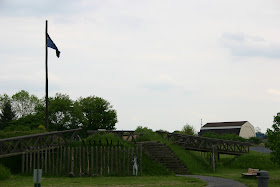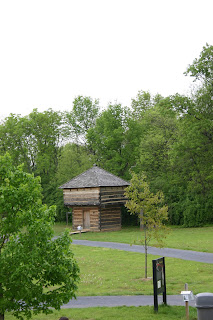Last week I had the opportunity to take my kids with our home school group to Carlisle, Pennsylvania for a day's tour of the Army Heritage Center. With displays on everything military from the French and Indian Wars through the War on Terror, I knew they would have fun--and I was hoping to come away with some nice pictures and research on that early stuff, since I seem to have fallen into writing books about wars. ;-)
Our tour began in the Colonial section of the center, where we got to watch a blacksmith at work in the Carlisle Forge. I've had this pleasure before, but it never really gets old to see how they take hunks of formless steel and turn them into works of art or function. What especially amazes me is how these dedicated reenactors can explain so much about the early days of our country and the craft they obviously love while performing it before our very eyes.
 |
| A few of the pieces this smith had done, based on original artifacts he had seen |
This gentleman explained about how a blacksmith was one of the most important people to any army. Each regiment would have one, but he would rarely see any fighting--they kept him well removed from the front lines, because he was too valuable to lose. He also explained, when someone mentioned how very lovely the pieces are, that what we deem beauty--those delicate curls and whisper-thin pieces of iron--were actually there for economy's sake. Iron was expensive, and never wasted. They made pieces as thin as they practically could to conserve the resources, and tapered them at the ends for the same reason.
From there our group ventured into more modern times, but I didn't pay quite as much attention to those. ;-) I was far more intrigued by the recreation of the Yorktown Redoubt...
...and in hearing the tales told to us by this wonderful historian at the Revolutionary Block House. We didn't get to go into the watch tower, but I thoroughly enjoyed hearing the guide talk about the long rifle he carried, the state of the roads in the day (I didn't realize they left the stumps of the trees they cut for roads, accounting for all those terrible bumps!), and why it was necessary to boil the salted fish three times before consuming it. Yes, to remove all the salt...but also to remove all the maggots. (Eww!) He also explained how the term "mess" came to be used for food in the military. Whenever they had fresh meat, each man would get a hacked-off portion. But they weren't exactly trimming steaks here--some men would end up with nice meat, others with nothing but bone and fat. So a group of six or so would throw this mess into a pot together with whatever vegetables they might have been given. The result was a stew that gained flavor from the bones and provided something to actually eat from the meat.
Our final stop of the day was to venture into the model of a Logg House. Originally set up to be supply stations between the forts during the French and Indian War days, they afterward became vital to settlers who wanted to trade, water their horses, or get fresh food. Unfortunately, most of these two-room homes were destroyed during Pontiac's War in 1763.
All in all, a fun day of hands-on discovery! (Oh, and the kids had fun too...) ;-)
~*~
Roseanna M. White pens her novels under the Betsy Ross flag hanging
above her desk, with her Jane Austen action figure watching over her.
When she isn’t writing fiction, she’s editing it for WhiteFire
Publishing or reviewing it for the Christian Review of Books, both of
which she co-founded with her husband.






I've been through Carlisle dozens of times and never knew this was here. Ugh.
ReplyDeleteI think it's actually pretty new...I wouldn't have had a clue it was there either if not for the homeschool group! =)
DeleteThanks for sharing your fun day with us, Roseanna! It all sounds so fascinating!
ReplyDeleteIt was! I think one of the best parts for me was listening to the reenactors, who so obviously love history as much as I do. (You have to, to wear those costumes on a hot, humid day!)
DeleteThanks for sharing Roseanna. I fall more and more in love with the colonial period as I read more and more about it.
ReplyDeleteSame here, Anne! I miss writing about it (working on a Civil War one right now, then will be zipping off to Regency/Early Victorian England for a series...), but I've got another Colonial idea up my sleeve and am so hoping to get to write it soon!
DeleteI'm glad the children gave you an excuse to visit (as if you needed one). I have to get back to Pennsylvania for a month. There are so many places I need to research - so many things to see - so many questions I need answered.
ReplyDeleteThank you for the visit.
Visited Carlisle, PA 37 years ago when friends were stationed at Carlisle Barracks. Quaint town and the gingerbread is delicious.Glad you got to visit. When I was homeschooling, I got to some fascinating places also.
ReplyDeleteAh, another of these posts that stir in me a longing to be nearer the settings of my stories. I so appreciate those who live near them visiting and sharing their experience. I'm filing this one away, because you never know...
ReplyDeleteThanks Roseanna!
Definitely an advantage of living on the east coast. =) I remember being very excited about that when I started working on LFY Annapolis . . . you know, after writing about Israel and Persia and Rome for years, LOL.
DeleteComing in here late, but wanted to say that I enjoyed this post. Looks like you had a great time. We visited a colonial fort a few days ago and the blacksmith's forge was exactly the same (Maine). Thanks for sharing. It was fun to contrast the two forts.
ReplyDelete